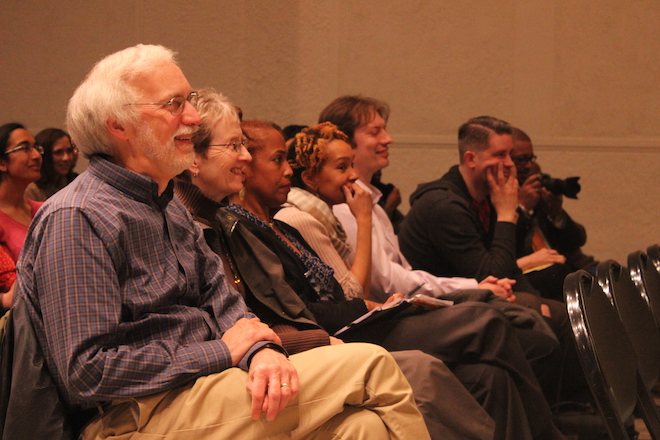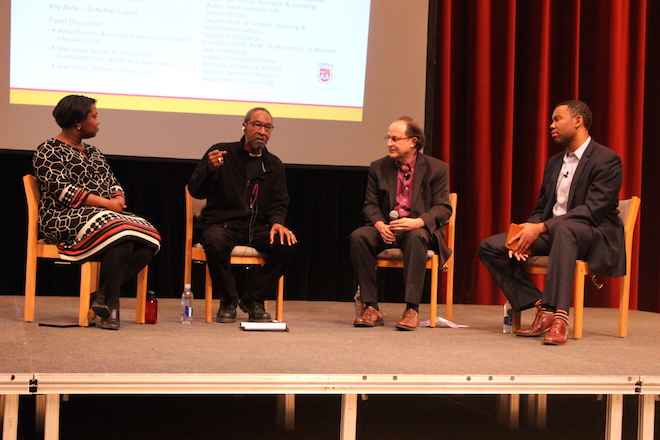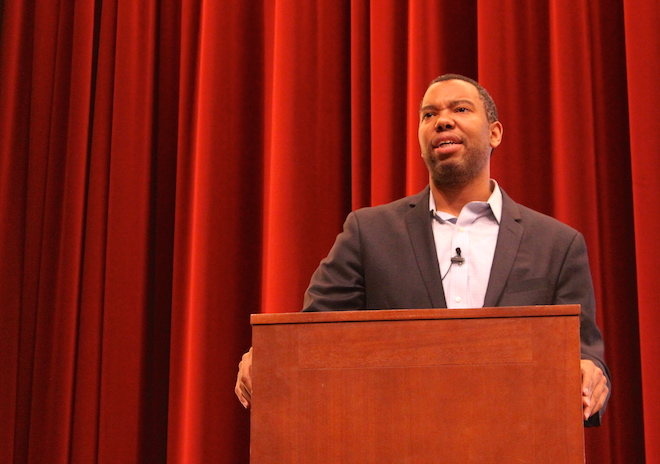America was built on a history of pillaging African-Americans, and this plunder continues today, Ta-Nehisi Coates said at a panel discussion at Loyola University Chicago on Tuesday.
Coates, a national correspondent for the Atlantic, is most known for writing “The Case for Reparations,” an examination of, among other things, the ongoing damage and inequality caused by historical and modern systems of racism in the United States.
Before Coates spoke, a video about the Contract Buyers League was shown, and then Coates spoke about housing policies that hurt African-Americans, a factor that makes America “a socially engineered society.”
After the Great Depression, the government allowed banks to give more mortgages and facilitate home buying. However, this only applied to white applicants. Other policies, Coates said, extracted wealth from African-Americans and lowered the value of African-American neighborhoods.
“If one African-American family moved to that block, that entire block became ineligible for investment,” Coates said. “As the white middle class is being formed, black people are being plundered.”
A panel also responded to the case for reparations from various angles. Anita Thomas, associate professor in School of Education at LUC; Billy Lamar Brooks Sr., director of YouthLAB@1512 at the Better Boys Foundation; and Juan Perea, Professor of Law at LUC were part of the panel.
Thomas focused on the education side of reparations.
“Educational debt is really the way we need to think about achievement disparities,” Thomas said. “The argument about race and how race is constructed in our country and led to our perception of intellectual inferiority is social engineering.”
Historically, African-Americans have had less access to literacy, schools, books, libraries, computers and quality teachers. Furthermore, Thomas said, 48 percent of black children are suspended from preschool, which impacts their educational future negatively.
“You cannot be prepared for college when your resources have been plundered through social engineering,” Thomas said.
Brooks said that Americans must understand racism as a bad product of the capitalist economic system.
“We know that without social justice, there can be no education for our young people,” Brooks said.
Perea focused on how American law has contributed to racism, framing the Constitution as a pro-slavery document. For example, the Constitution protected slave owners through the three-fifths compromise, the prohibition to limit the slave trade and the fugitive slave clause.
“If we understood the Constitution as pro-slavery, we would consider different themes,” Perea said. “We would understand that over time, the Supreme Court has done much more harm than good to people of color. Nowhere in the document is slavery mentioned directly by name, yet throughout, slavery is protected.”
Coates agreed, saying the Constitution has also contributed to criminalization of African-Americans.
“When you’re declared a criminal, you’re outside the protection of the law,” Coates said. “It originates with this document in this country. To be black and normal in this country was a criminal act.”
The G.I. Bill also led to wealth disparity between whites and blacks, Perea said. While white veterans were allowed to receive mortgages, allowing them to own homes and move to the suburbs, these benefits were denied to African-American veterans.
Since homes account for about 60 percent of the wealth for the American middle class, differences in home-owning contributed to a large gap in socioeconomic status.
“This is why we have rich white suburbs surrounding black inner cities,” Perea said.
After “The Case for Reparations” was published, many people reacted by asking why they did not know about this oppression and institutional racism. Brooks said that as an African-American student in the 1960s, he knew nothing of slavery.
“This government will fully and intentionally keeps history of their misdeeds out of history books,” Brooks said.
Coates said that Americans must acknowledge racism’s existence, even today.
“I think the problem is, we think the problem of racism is a problem of manners,” Coates said. “We think it is a problem of the past, when white people were not very polite to black people…Your great great great great great grandfather may not have owned slaves, but he wanted to own slaves.”
Although the panel discussion took place at Loyola University, many students from Northwestern University attended, including Weinberg junior Hope Iyiewuare.
“Ignorance is intentional,” Iyiewuare said. “This is my effort to reeducate myself.”
Medill sophomore Rachelle Hampton has been following and reading Coates’ works.
“When I heard he was coming and it was free, I literally dropped everything to come here,” Hampton said. “The most interesting part was hearing the legal history of white people in the country.”
After all, institutional racism and the socioeconomic gap between blacks and whites is rooted in the beginnings of this nation.
“When you take things from people, you should try to give them back. After 250 years of pillaging, we follow this up with more pillage,” Coates said. “One cannot ignore history.”


